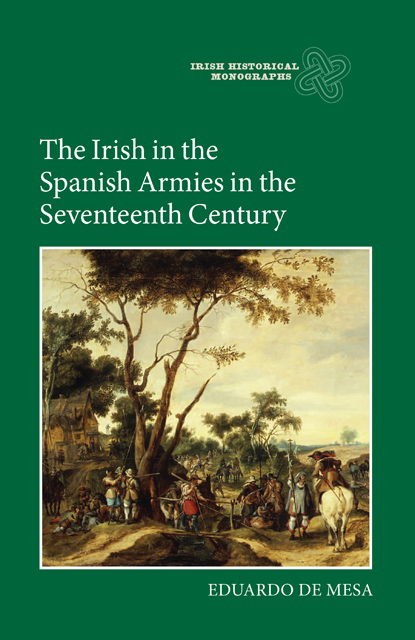5 - The War Experience of Tyrone’s Tercio, 1638–42
Published online by Cambridge University Press: 23 February 2023
Summary
The arrival at La Coruña
On 24 March 1638 a convoy of thirty ships under the command of Don Lope de Hoces sailed from Dunkirk and Mardyck to the Peninsula escorted by thirteen ships of the Armada of Flanders and three privateer ships. The vessels carried Tyrone’s and Tyrconnell’s Tercios (around 1,500 men with their wives and children), Archduke Carlos of Austria, and Prince Tommasso di Savoia- Carignano who was returning to Savoy via Spain. At the end of the expedition, the fleet of Hoces had captured more ships than the number of vessels under his command with a total tonnage larger than his own fleet. Some of the Irish soldiers were used to guard the prizes, with twenty of them being sent to one of the captive ships.
When the Spanish court knew that the arrival of the Irish Tercios was imminent, the Junta de Ejecución wrote to the marquis of Mancera, governor-general of Galicia, in order to ask him what he would need to accommodate the soldiers and to prepare for their disembarkation. The troops were to be readied for transfer to Catalonia as soon as possible.
Problems in port
The Irish Tercios arrived at La Coruña on 12 April 1638. As soon as Tyrone and Tyrconnell disembarked, they asked for a licence to attend court to make further arrangements for themselves and their soldiers. The Irishmen had sailed with their families, many of whom were sick after the long journey of nearly eight weeks. The main concern was the maintenance of the troops; there was a danger that many soldiers would leave if they did not receive some money. The Council of War accepted the counts’ petition but on condition that they first had to have everything ready to transfer their units to Catalonia via San Sebastián. In the meantime the money was transferred to La Coruña. Hoces had explained to Mancera that he would like to disembark the soldiers as they were a danger to the whole fleet. As many of the Irish smoked tobacco, he was worried about the possibility of a fire that could destroy all the ships in harbour.
- Type
- Chapter
- Information
- The Irish in the Spanish Armies in the Seventeenth Century , pp. 137 - 164Publisher: Boydell & BrewerPrint publication year: 2014

